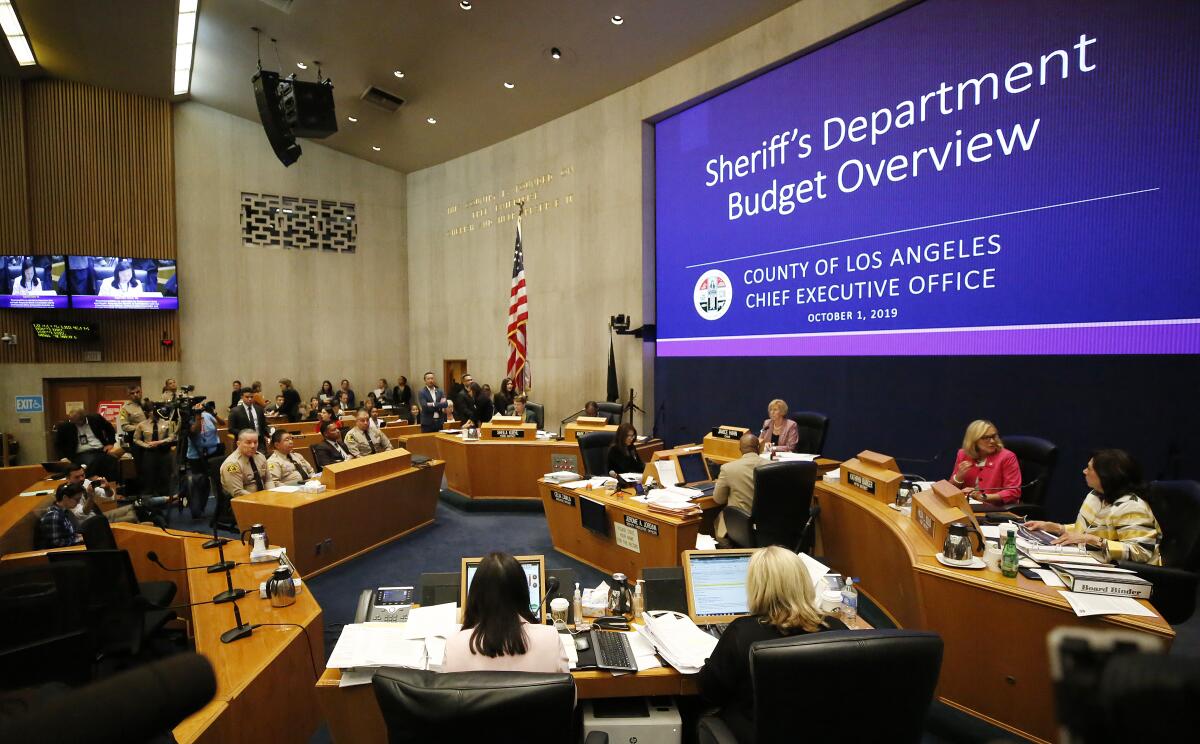Editorial: Let L.A. County supervisors impeach the sheriff?

With enough votes, Congress can impeach the president. So shouldn’t a county board of supervisors be able to impeach a sheriff?
A proposed ballot measure to that effect has been drafted by a coalition of community groups and is being circulated among Los Angeles County supervisors. If it comes before voters and is approved, the board would be able to remove the sheriff for enumerated reasons that amount to violations of the public trust.
Crazy idea, right? Sheriffs are independently elected. Boards of supervisors can mess with their budgets, but they otherwise can have no authority over sheriffs. Or so it was long assumed.
But long-held beliefs about sheriff autonomy and the inviolability of their power have been steadily evaporating since L.A. County Sheriff Lee Baca resigned his office in 2014 amid a federal probe into jail beatings. (Baca was eventually indicted and convicted of obstruction of justice.)
Baca clung to the myth of unaccountable sheriffs. When L.A. County voters approved term limits in 2002, Baca argued that the state Constitution didn’t allow such meddling in his office, and the state Supreme Court agreed. Its ruling helped blunt efforts to rein in the sheriff in any fashion. Even outrage over the brutal beating of jail inmates by sheriff’s deputies left Baca unmoved. Asked by the Citizens’ Commission on Jail Violence how he could be held accountable, Baca said there was only one way: “Don’t elect me.”
In other words, Baca was saying, sheriffs don’t get appointed or removed the way police chiefs do. They are subject only to being denied re-election or being recalled by the voters. They can’t be overseen by civilian boards, like the L.A. city Police Commission.
Or can they? In other counties, the cult of the all-powerful sheriff has held less sway. San Diego County voters created a civilian review board in 1990, and the state Supreme Court upheld its powers.
And the San Bernardino County Board of Supervisors adopted an ordinance in 2002 that provides for removal of sheriffs — independently elected though they may be — on a four-fifths vote of the board. A court upheld that law as well.
After Baca’s departure, the L.A. County Board of Supervisors created an inspector general and the nine-member Civilian Oversight Commission similar to San Diego’s. In line with the lingering belief that supervisors can’t limit sheriff power, the inspector general currently gets only the information the sheriff wants to give him, and the commission has virtually no formal authority over the department.
But that could soon change. A measure on the March 3 ballot would give the commission and the inspector general power to compel witnesses to appear and internal files to be turned over for inspection. The San Diego court ruling would appear to support such authority, but just in case, a bill to explicitly grant subpoena power is making its way through the California Legislature.
At issue are oversight and accountability. A virtual cult of sheriff power holds sway in many parts of the nation, where advocates of the so-called constitutional sheriff’s movement argue that sheriffs are a county’s top executives, superior to federal authorities, police chiefs, even boards of supervisors. But no elected official — and especially not a law enforcement official — should be free of constitutional checks and balances. “Don’t elect me” is an insufficient oversight principle.
Current Sheriff Alex Villanueva, although no fan of Baca, appears to agree with him regarding sheriff power. He has branded oversight commission members as political appointees with no formal power over him. The supervisors have begun to see things differently, especially after clashes with the sheriff over his hiring and spending practices.
Sheriff impeachment would not be parallel to presidential impeachment because county government is so oddly assembled, with supervisors who act as executives as well as lawmakers. Proper county checks and balances would require a strictly legislative board with either a mayor-like elected executive or an appointed county manager who in turn appoints a sheriff, in much the way cities pick police chiefs.
Short of a major county government revamp, there are serious questions to be asked about the wisdom of sheriff impeachment. But the proposal’s mere existence suggests that L.A. County residents are no longer willing to acquiesce to the notion that sheriffs are invulnerable to civilian oversight. That’s a step in the right direction.
More to Read
A cure for the common opinion
Get thought-provoking perspectives with our weekly newsletter.
You may occasionally receive promotional content from the Los Angeles Times.










